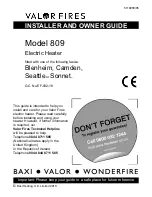
www.desatech.com
119426-01A
26
FRONT BURNER FLAME PATTERN
Figure 38 shows correct front burner flame pat
-
tern. Figure 39 shows incorrect front burner flame
pattern. The incorrect burner flame pattern shows
yellow tipping at top of blue flame.
WARNING: If yellow tipping
occurs, your heater could pro-
duce increased levels of carbon
monoxide. If front burner flame
pattern shows yellow tipping,
follow instructions at bottom of
this page. Yellow flame on rear
burner is normal.
NOTICE: Do not mistake orange
flames with yellow tipping. Dirt
or other fine particles are burned
by heater, causing brief patches
of orange flame.
If front burner flame pattern is incorrect, as shown
in Figure 39
• turn heater off (see
To Turn Off Gas to Appli-
ance
, page 21 [Thermostat-Controlled Models]
or page 23 [Remote-Ready Models])
• see
Troubleshooting
, page 28
INSPECTING bURNERS
Continued
Figure 38 - Correct Front Burner Flame
Pattern
Figure 39 - Incorrect Front Burner Flame
Pattern
Yellow Tipping At
Top of Blue Flame
CLEANING AND
MAINTENANCE
WARNING: Turn off heater
and let cool before cleaning.
CAUTION: You must keep
control areas, burners and
circulating air passageways
of heater clean. Inspect these
areas of heater before each use.
Have heater inspected yearly
by a qualified service person.
Heater may need more frequent
cleaning due to excessive lint
from carpeting, pet hair, bedding
material, etc.
WARNING: Failure to keep
the primary air opening(s) of
the burner(s) clean may result in
sooting and property damage.
BURNER INjECTOR HOLDER AND
PILOT AIR INLET HOLE
The primary air inlet holes allow the proper amount
of air to mix with the gas. This provides a clean
burning flame. Keep these holes clear of dust, dirt,
lint and pet hair. Clean these air inlet holes prior to
each heating season. Blocked air holes will create
soot. We recommend that you clean the unit every
three months during operation and have heater
inspected yearly by a qualified service person.
We also recommend that you keep the burner
tube and pilot assembly clean and free of dust and
dirt. To clean these parts we recommend using
compressed air no greater than 30 PSI. Your local
computer store, hardware store or home center
may carry compressed air in a can. You can use a
vacuum cleaner in the blow position. If using com
-
pressed air in a can, please follow the directions on
the can. If you don’t follow directions on the can,
you could damage the pilot assembly.
1. Shut off the unit, including the pilot. Allow
the unit to cool for at least thirty minutes.
2. Inspect burner, pilot and primary air inlet holes
on injector holder for dust and dirt (see Figure
40, page 27).
3. Blow air through the ports/slots and holes in
the burner.
















































